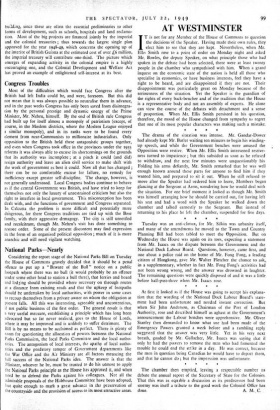AT WESTMINSTER
IT is not for any Member of the House of Commons to question the decisions 'of the Speaker. Having made their own rules, they elect him to see that they are kept. Nevertheless, when Mr. Ellis Smith rose to a point of order on Monday night and asked Mr. Bowles, the deputy Speaker, on what principle [host who had spoken in the debate had been selected, there were at least twenty people in the chamber who sympathised with him. When a grand inquest on the economic state of the nation is held all those who specialise in economics, or have business interests, feel they have a right to be heard, and arc disappointed if they are not. Their disappointment was particularly great on Monday because of the seriousness of the situation. Yet the Speaker is the guardian of the rights of every back-bencher and of the tradition that the House is a representative body and not an assembly of experts. He alone can view the course of the debates with detachment and a sense of proportion. When Mr. Ellis Smith persisted in his question, therefore, the mood of the House changed from sympathy to regret that one of its most popular characters was making such a mistake.
* * * *
The drama of the situation was intense. Mr. Gandar-Dower had already kept Mr. Butler waiting ten minutes to begin his winding- up speech, and while the Government benches were amused the Opposition were restive. When Mr. Ellis Smith intervened restive- ness turned to impatience ; but this subsided as soon as he refused to withdraw, and the next few minutes were unquestionably his. Folding his arms defiantly, Mr. Smith remarked that he was well enough known around these parts for anyone to find him if they wanted him, and prepared to sit it out. When he still refused to move after the Speaker had ordered him to leave, Members began glancing at the Sergeant at Arms, wondering how he would deal with the situation. For one brief moment it looked as though Mr. Smith was himself arranging how he should be carried out, for having left his seat and had a word with the Speaker he walked down the chamber and talked earnestly to the Sergeant. But instead of returning to his place he left the chamber, suspended for five days.
* * * a Tuesday was an anti-climax, for Mr. Silkin was urbanity itself, and many of the amendments he moved to the Town and Country Planning Bill had been tabled to meet the Opposition. But on Wednesday the House was again on its toes, expecting a statement from Mr. Isaacs on the dispute between the Government and the National Dock Labour Board. Questions, however, came first, and one about a police raid on the home of Mr. Fong Fong, a leading citizen of Hongkong, gave Mr. Walter Fletcher the chance to ask, in a supplementary, whether in fact Mr. Fong Fong's activities had not been wrong wrong, and the answer was drowned in laughter. The remaining questions were quickly disposed of and it was a little before half-past-three when Mr. Isaacs rose.
. a
At first it looked as if the House was going to accept his explana- tion that the wording of the National Dock Labour Board's state- ment had been unfortunate and needed instant correction. But when Sir John Anderson, as Chairman of the Port of London Authority, rose and described himself as aghast at the Government's announcement the Labour benches were apprehensive. Mr. Oliver Stanley then demanded to know what use had been made of the Emergency Powers granted a week before and a rambling reply suggested that the answer was very little. Yet in his very next breath, goaded by Mr. Gallacher, Mr. Isaacs was saying that it only he had the powers to remove the men who had fomented the trouble he could end the strike in a day. He was correct, because the men in question being Canadian he would have to deport them, and that he cannot do ; but the impression was unfortunate.
The chamber then emptied, leaving a respectable number to debate the annual report of the Secretary of State for the Colonies. That this was as equable a discussion as its predecessot had been stormy was itself a tribute to the good work the Colonial Office has


































 Previous page
Previous page